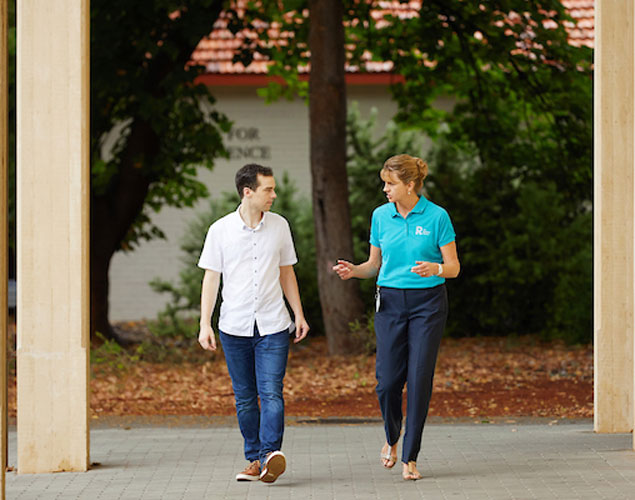Research conducted with the Raine Study falls under one of 14 special interest groups (SIGs).
One of those special interest groups looks specifically at education and work data.
The focus of the Education and Work Special Interest Group is to provide rich data on important factors which shape participants’ education and work outcomes.
This includes data on parental health, socio-economic and educational background; prenatal development; early childhood development; childhood health status; school experience, including bullying; and eventually, educational choices.
SIG Leaders
We are fortunate enough to have some well-known researchers from across Australia leading this SIG.
Dr Paul Koshy, National Centre for Student Equity in Higher Education, Curtin University
 Dr Paul Koshy is currently a Research Fellow at the National Centre for Student Equity in Higher Education (NCSEHE) at Curtin University. His primary area of focus is the determinants of higher education participation in Australia.
Dr Paul Koshy is currently a Research Fellow at the National Centre for Student Equity in Higher Education (NCSEHE) at Curtin University. His primary area of focus is the determinants of higher education participation in Australia.
Additionally Dr Koshy has conducted research projects for state and national government agencies, private sector clients and international agencies including AusAid. Dr Koshy’s recent work is on geographical measures of socioeconomic status and their use in Australian higher education policy, an examination of parental educational aspirations for their children, and an analysis of the effect of institutional status on graduate outcomes.
Dr Lynette Vernon, National Centre for Student Equity in Higher Education, Curtin University
 Dr Lynette Vernon is currently a collaborative post-doctoral fellow with Murdoch University and the National Centre for Student Equity in Higher Education at Curtin University.
Dr Lynette Vernon is currently a collaborative post-doctoral fellow with Murdoch University and the National Centre for Student Equity in Higher Education at Curtin University.
Dr Vernon has 20 years of experience in teaching across Western Australia for the Department of Education.
Dr Vernon’s Doctorate of Philosophy in Psychology included research interest in the mental health and well-being of adolescents, particularly in relation to their use of technology and impact on their sleep.
Dr Patrick Dunlop, Curtin University
 Dr Patrick Dunlop is currently a researcher at the Curtin University Future Work Group. Dr Dunlop is undertaking research in psychometric assessment in organisations, impression management and faking behaviour in self-report personality assessments and volunteer recruitment and retention.
Dr Patrick Dunlop is currently a researcher at the Curtin University Future Work Group. Dr Dunlop is undertaking research in psychometric assessment in organisations, impression management and faking behaviour in self-report personality assessments and volunteer recruitment and retention.
Key Findings of the SIG
Thanks to the ongoing involvement of our participants, this SIG has been able to make a huge range of life-changing discoveries, including:
- Maternal stress affected children’s scores on literacy and numeracy at 10 year of age, but affected girls and boys differently, with some girls showing lower reading scores but boys seeing increases in reading and writing scores.
- Children whose mothers exhibited hypertensive disease during pregnancy exhibited a small decrease in verbal ability at 10 years of age.
- Children with a specific language impairment at 10 years of age were more likely to have a small head circumference at birth, but not at 18 weeks gestation or as infants. Brain development may be disrupted in specific language impairment.
- Predominant breastfeeding for six months or longer, and a good quality diet in the early years, may have a positive effect on academic achievement.
- Better overall diet quality during the early years of life was associated with better mathematics, reading, writing and spelling scores in later childhood.
- Boys whose fathers worked 55 hours or more per week had significantly higher levels of problem behaviour.
- Children with “stay-at-home” mums in early-to middle-childhood had better diet in adolescence.
- Among preschoolers, children were less likely to be overweight or obese when mothers worked less hours per week. For older children (ages eight to 14), working shorter or longer hours were both associated with increases in weight and obesity.
- In adolescents, involvement in peer aggression was associated with non-completion of secondary school which, in turn, was associated with an increased risk of poor educational and employment outcomes in early adulthood.
- Young adults who experienced spinal pain in adolescence were three times more likely to miss work, compared to those who did not.
- Comorbidity (i.e., two conditions occurring at once) of spinal pain and mental ill-health was associated with increased absence of work at 22 years of age, but not reduced productivity while at work.
For more information on key findings from this Special Interest Group, visit our Education and Work Special Interest Group page.

